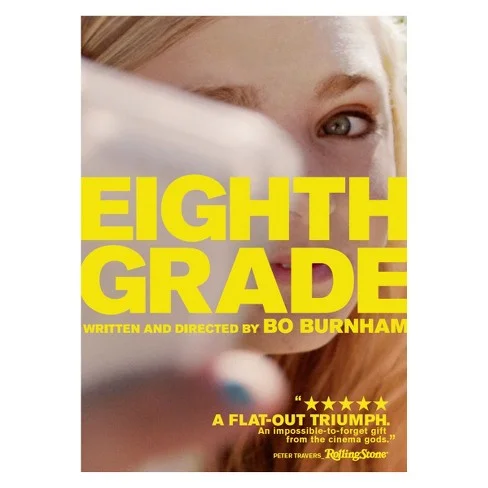I’ve long been a fan of Bo Burnham’s anxiety-driven comedy. Much of it is crude, but unlike other comedians who use vulgarity for shock value, I believe Burnham uses that crudeness to reflect our own ugliness back at us, to show us how we constantly do things that are bad and unhealthy for us, and to push us to adopt a better way of life. His stand-up routines lull the audience into a cycle of increasing absurdity, only to all the sudden break the cycle and punch you in the gut with a moment of utter and brutal honesty that leaves you pondering your own life.
Burnham has things to say, and he uses the veil of comedy to say them.
In his directorial debut Eighth Grade Burnham brings many of his common themes – anxiety, depression, the unhealthy dangers of social media – to bear on the life of typical middle-school student Kayla Day, with an able and convincing performance from Elsie Fisher. The film chronicles the final days of Kayla’s titular school year as she transitions into the even more overwhelming environment of high school.
Burnham paints Kayla as a shy, well-intentioned teenager who just wants to find a place to belong, but doesn’t quite know how. Her sense of self is pulled in a thousand different directions by idolized popstars, social media, and everything that society and culture is telling her she should be. She constantly gazes from afar at the boy she likes, the popular girls she wants to emulate, and the older teenagers she looks up to, unsure how to break into their inner circles. She is constantly telling herself that if she’s just pretty enough, just confident enough, just outgoing enough, then everything will turn out alright. She posts videos giving life advice that no one watches, in which it seems she’s simply repeating the things she thinks she’s supposed to say.
Some of these moments are genuinely funny. Most of them are heartbreaking, which is par for the course with Burnham’s particular brand. Burnham portrays Kayla in such a way that you really just want to step into the screen and give her – and by proxy your own past teen-self - a hug, assure them that everything will be ok, and that those days won’t last forever.
Eighth Grade thoroughly succeeds at capturing the endless and seemingly hopeless years in school that most experience. It’s cringey, it’s embarrassing, it’s awkward. It’s also brutally honest and absolutely true. It deftly portrays the discomfort and tragedy of growing up, and the struggle of wading through who you’re supposed to be to find who you really are.
Kayla learns some very hard lessons – not in a trite, after-school special kind of way, but in a very real way - about not looking up to or emulating the wrong people, being comfortable in your own skin, and realizing that the shyness and anxiety may never really go away, and that’s ok. Because you can build your life the way you want it, and when you find your people, none of that other stuff will matter.
Eighth Grade is worth a watch, even if its ultimate message is a bit muddled. And you should be prepared for the awkwardness and crude reality of the world in which we live. And if you’re interested in more, check out Burnham’s Netflix stand-up special Make Happy (with the same caveats).
As always, thanks for reading.
